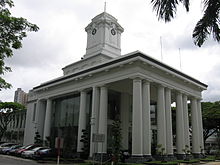
Back الرعاية الصحية في سنغافورة Arabic シンガポールの医療 Japanese Healthcare in Singapore SIMPLE Y tế Singapore Vietnamese

Healthcare in Singapore is under the purview of the Ministry of Health of the Government of Singapore. It mainly consists of a government-run publicly funded universal healthcare system as well as a significant private healthcare sector. Financing of healthcare costs is done through a mixture of direct government subsidies, compulsory comprehensive savings, national healthcare insurance, and cost-sharing.
The Singaporean public health insurance system is based on programs run by the Central Provident Fund, primarily Medisave, a mandatory medical savings account scheme. All working citizens and permanent residents are obligated to set aside a portion of their income into Medisave accounts, which they can draw upon to pay their own medical bills and those of their immediate family. The Central Provident Fund also manages the MediShield and MediFund insurance schemes, which cover people with insufficient savings or those who have depleted their savings. In addition, the government provides subsidies for the medical expenses of citizens and permanent residents who receive treatment in public hospitals.
Singapore generally has an efficient and widespread system of healthcare. In 2000, Singapore was ranked 6th in the World Health Organization's ranking of the world's health systems.[1] Bloomberg ranked Singapore's healthcare system the most efficient in the world in 2014.[2] The Economist Intelligence Unit placed Singapore 2nd out of 166 countries for health-care outcomes.[3] Bloomberg Global Health Index of 163 countries ranked Singapore the 4th healthiest country in the world and first in Asia.[4]

As of 2019, Singaporeans have the world's longest life expectancy, 84.8 years at birth. Women can expect to live an average of 87.6 years with 75.8 years in good health. The averages for men are lower, with a life expectancy at 81.9 years with 72.5 years in good health.[5]
According to global consulting firm Towers Watson, Singapore has "one of the most successful healthcare systems in the world, in terms of both efficiency in financing and the results achieved in community health outcomes".[6] For the most part, the government does not directly regulate the costs of private medical care. These costs are largely subject to market forces, and vary enormously within the private sector, depending on the medical specialty and service provided.[6]
- ^ The World Health Report 2000 : Health Systems : Improving Performance. Geneva, Switzerland: World Health Organization. 2000. p. 154. ISBN 978-92-4-156198-3.
- ^ "Most Efficient Health Care Around the World". Bloomberg. Archived from the original on 18 June 2020. Retrieved 25 January 2017.
- ^ "Singapore ranked world's No. 2 for health-care outcomes: EIU". Bloomberg.com. 27 November 2014. Archived from the original on 14 June 2021. Retrieved 10 May 2018.
- ^ "Singapore healthiest Asian country; Italy tops global list despite economic crisis". Bloomberg.com. 20 March 2017. Archived from the original on 8 September 2021. Retrieved 10 May 2018.
- ^ "Singaporeans have world's longest life expectancy at 84.8 years". Straits Times. 20 June 2019. Archived from the original on 2 September 2019. Retrieved 2 September 2019.
- ^ a b John Tucci, "The Singapore health system – achieving positive health outcomes with low expenditure", Watson Wyatt Healthcare Market Review, October 2004. Archived 19 April 2010 at the Wayback Machine
© MMXXIII Rich X Search. We shall prevail. All rights reserved. Rich X Search